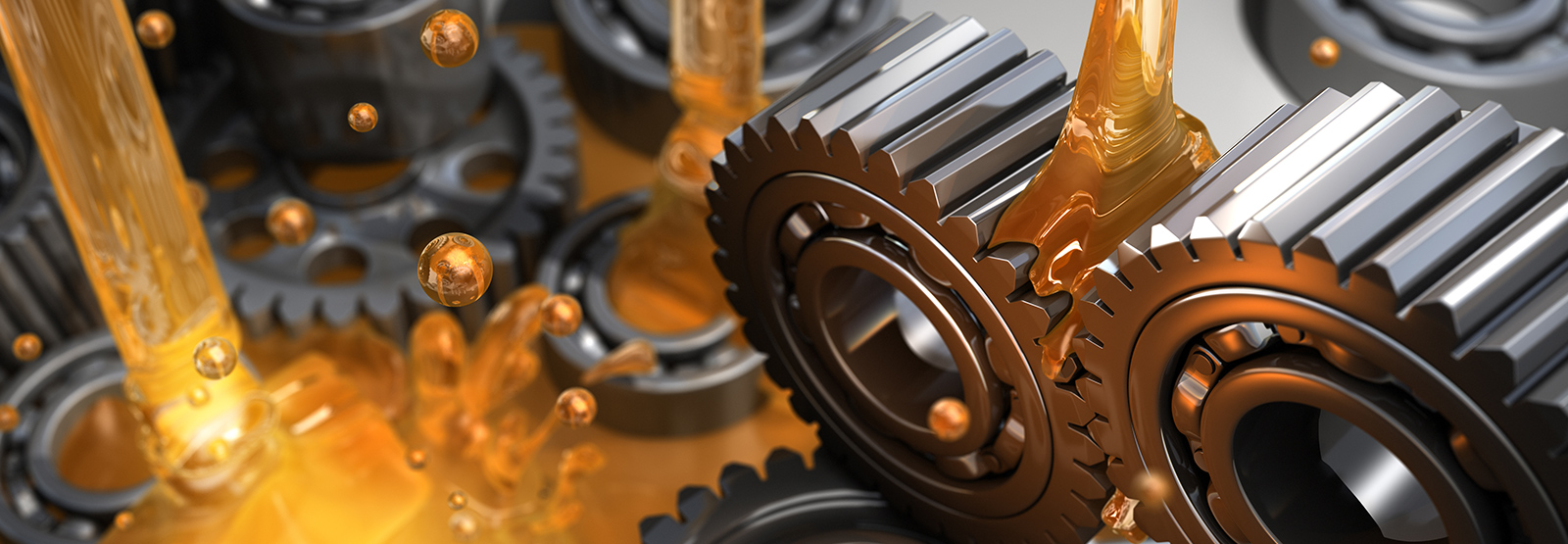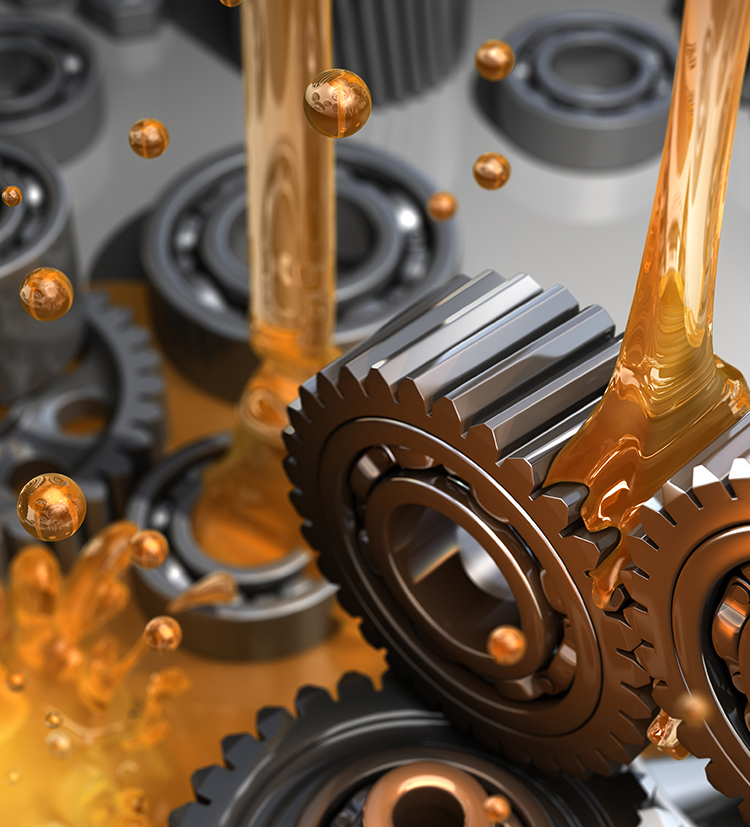EP Lubricant Additives
Algae-Based EP Additive DAILUBE™ KS-519
Functional Products
Automotive
Algae-Based EP Additive DAILUBE™ KS-519
Functional Products
Automotive


As an alternative to traditional vegetable and animal oils, algae-based DAILUBE™ KS-519 extreme-pressure lubricant additives deliver new sustainable raw materials for metalworking fluids and greases designed to meet the demands of electric and hybrid vehicle manufacturers.
Extreme-pressure additives (EP additives) are lubricant compounds for high-pressure applications, including gear assembly, metal forming, and metal cutting. With a global 20 – 30% market share of Sulfur EP additives, DIC DAILUBE™ sulfurized EP additives have a proven track record for high performance and reliability.
Building on DIC's global reputation for premium sulfur-based lubricant additives in formulations designed to meet exacting metalworking requirements and honoring its ongoing environmental commitment, DIC has developed a ground-breaking series of algae-based EP additives that promote greater sustainability.
Global lubricant suppliers producing automotive lubricants, industrial lubricants, lubricating greases, and metal processing lubricants seeking KS-519 samples for testing in lubricant oil formulations or machine parts, gears, or bearings can meet EP additives industry expert and KS-519 development team leader Hironobu Matsueda at the 78th STLE Annual Meeting & Exhibition, May 19 – 23, 2024, at the Minneapolis Convention Center.
If you’re attending this year’s STLE event, please email us now to set up an appointment.
Team leader and KS-519 developer Hironobu Matsueda notes, “With rising electric and hybrid vehicle industry demand, we expect larger automobile parts to be in higher demand than smaller parts, increasing press processing within the automobile industry overall, and thus creating greater demand for sulfurized oils. We believe KS-519 offers higher performance than conventional sulfurized oils while providing greater sustainability than other vegetable-based oils.”
“KS-519 represents the first development using new fats, and its characteristics make it suitable for applications requiring load-bearing and thermal stability, such as press processing and grease. We plan to continue developing sulfur-based extreme pressure agents, including active and high-viscosity types, utilizing new fats to adapt to various applications.”
“KS-519 also benefits cutting oil processes by reducing energy usage. Manufacturers prefer using low-viscosity lubricating oils for cutting processes, as lubricants must spread to each corner during machining. Neither sulfurized lard nor other high-viscosity types are suitable. Manufacturers often use products with medium viscosity or lower (40°C dynamic viscosity: 400 mm2/s or lower), making KS-519 an ideal solution.”
While mineral oil lubricants were once among the most used for metalworking fluids, non-mineral oil lubricants are expanding, notably in operations or industries with sustainability criteria and strict environmental regulations.
Vegetable oil types are often biodegradable and more environmentally friendly than standard mineral oil-based lubricants. Moreover, formulators can combine vegetable oils with additives to enhance their performance, including lubricity, cooling properties, and stability.
Vegetable oils (canola, palm, etc.) are prime examples of the most common types used in metalworking fluids due to their efficient supply and greater sustainability than animal-based oils. The growing population’s need for more food and increasing industrial demand for bio-based materials are increasing the demand for vegetable oils thus opening the door for an alternative to vegetable oils in lubricants.
With growing global concerns over the continued use of fossil fuels, electric and hybrid vehicle production continues to increase. Rising electric and hybrid vehicle production and increasing regulations on environmental impacts have boosted demands for vegetable oil lubricants.
Larger automobile parts are expected to be in higher demand than smaller parts, increasing press processing that traditionally uses sulfurized vegetable oil within the automobile industry.
Rising electric and hybrid vehicle production and increasing environmental regulations have boosted demand for vegetable oil lubricants. Larger automobile parts are expected to be in higher demand than smaller parts, increasing press processing that traditionally uses sulfurized vegetable oil within the automobile industry.
KS-519 is projected to deliver higher performance than all vegetable oil-based alternatives—a solution in high demand, notably in the European Union and North America, where environmental regulations already impact major industry player operations. Initial testing performed by DIC customers is delivering very promising results, where KS-519 demonstrates very high lubricity scores, on par with darker, lard-based oils, yet possessing the light color and lower viscosity and odor of common to vegetable oil-based formulations.
EP additives like GS-240 made with conventional vegetable oils usually have higher iodine values (more unsaturated double bonds) than lard oil types and often produce sludge.
Conversely, lard oil types like GS-210 and GS-110 have many saturated components and excellent oxidation resistance.
KS-519 shows the same or better performance as lard oil types, even though it is more akin to a vegetable oil in terms of its light color and odor. KS-519 can protect metal parts from friction over a long period of time and extend the life of metal parts.
DIC believes sustainability means finding new ways of using the Earth's resources more efficiently while balancing environmental protection and economic prosperity. Here, DIC is working to develop more environmentally friendly products together with biotechnology pioneer Checkerspot.
Checkerspot ferments algae to make renewable oils at a commercial scale for performance materials and ingredients. Its proprietary WING® Platform supplies 100% biobased, algae-derived lubrication inputs that surpass the performance properties of other EP additives on the market, once again demonstrating that sacrificing performance for sustainability is a false choice. Checkerspot CEO and Co-founder Charles Dimmler says, "We’re excited to work with DIC to commercialize the world’s first algae oil-based high-performance sulfurized EP additive. DAILUBE™ KS-519 proves performance needn't be compromised by sustainability."
Checkerspot CSO and Co-founder Scott Franklin adds, "New algae oil-based EP additives present another opportunity to show the world that algae fermentation utilizing Brazilian sugarcane co-located with the plant… delivers a more sustainable method for producing triglyceride oils. This collaboration with DIC will showcase these performance benefits to a broader audience hungry for sustainable, high-performance lubricants with reduced carbon footprints."
DIC’s new innovative algae oil-based sulfurized additives may reduce carbon emissions in industrial production while reducing environmental burdens through more effective land and water use. By developing more efficient algae oil-based materials, DIC aims to reduce industrial environmental impacts so that we can pass on a rich natural environment to future generations.
Using algae oil-based KS-519 as an EP additive can reduce carbon emissions by 5% compared to GS-240, a sustainable vegetable oil–based product in the DAILUBE™ series. Moreover, the algae oil used in KS-519 requires approximately 85% less cultivated land than canola oil and approximately 87% less water than palm oil per kg of oil, as set out in more detail below, and is thus expected to contribute to a significant reduction in environmental impact.
All carbon footprint calculations follow the International Organization for Standardization’s ISO 14040, ISO 14044, and ISO 14067 standards and are based on cradle-to-gate emissions data. Emissions factors were developed from primary and secondary data collected from, among others, supplier and industry organization databases and the Inventory Database for Environmental Analysis (IDEA). Data for algae oil and other vegetable oils is from Checkerspot, Inc., of the United States, a manufacturer of algae oil raw materials and ingredients. Biogenic emissions are not considered.
Source: 2016 TerraVia Sustainability Report, Cradle-to-Gate Analysis, Reviewed by ISO 14040/44 standards, which compared carbon emissions, water, and land use of unrefined algae oil made from sugarcane in Brazil to publicly available data for other major commercial oils grown globally (e.g., Canola oil from Canada, Soybean oil from Brazil, Sunflower oil from France, Palm and Palm Kernel oils from Malaysia, among others) and relied on data from
• Murphy, D. J. (2009). Global oil yields: Have we got it seriously wrong? AOCS.http://www.aocs.org/Membership/informArticleDetail.cfm?ItemNumber=1102(FAO Statistical Databases and Technical Conversion Factors for Agricultural Commodities)
• IndexMundi, 2014
• Ruitenberg, 2014
DAILUBE™ KS-519 algae-based EP additives deliver the light-color and low-odor properties of vegetable oils, while also producing the metalworking fluid and gear oil formulations with the performance of animal lard oils
• Light color and low odor properties for increased productivity and quality.
• High extreme-pressure performance, anti-wear resistance, and coefficient friction reduction capabilities.
• High base oil solubility at a high flash point for metal working lubricants at specific viscosity levels, sulfur content, and active sulfur point.
• Automotive
DAILUBE™ KS-519 algae-based EP additives are the ideal solutions for metalworking needs for electric vehicle automotive manufacturing, including metalworking fluids for machining parts and grease or gear oil additives.